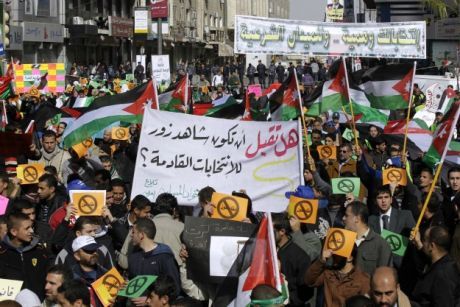News
You are here
Jordan: the king's elections can't contain the Arab Spring

January 31, 2013
King Abdullah II, Jordan’s ruling monarch, has heralded the January 23 parliamentary elections as a turning point in the so-called democratization of Jordan.
Jordan has seen protests and strikes as part of the Arab Spring revolt against austerity, repression and imperialism. The regime responded with promises for reform while imposing further austerity and welcoming US troops--but this sparked civil disobedience and calls for mass strikes.
The King is hoping the latest elections will quell the outrage. Parliamentary elections are not new to the people of Jordan, who have been pressuring the ruling family for democratic reforms since 1989. However, according to Khalid Kamhawi, a Jordanian political activist, past elections have been “an effective tool in the ruling regime’s arsenal for decades, creating a façade of civic participation, behind which the apparatuses of the palace employ various methods to control its timid representatives.”
There is a great deal of skepticism as to whether or not the latest election, Jordan's first since the Arab Spring uprisings, will prove to be any different. Opposition groups boycotted the election in protest, because they see little promise in King Abdullah’s most recent democratic reforms.
While the Western backed King Abdullah has agreed to hand over much of the day-to-day running of the country to the newly elected legislature and to consult parliament on choosing the country’s prime minister, he retains control over foreign policy and security measures, as well as the power to dissolve and recall parliament at will. Furthermore, the electoral ridings have been gerrymandered to over-represent under-populated areas where voting is influenced by family ties to tribal leaders that are loyal to the king and to under-represent the more populated urban areas where voting favors ideologically-based political parties. Subsequently, preliminary election results show the majority of seats going to tribal leaders, pro-regime loyalists, and independent businessmen.
The elections have clearly not changed the regime's Western-backed repressive apparatus, as security forces quelled demonstrations against the election results in cities throughout Jordan. Like the rest of the Arab Spring, the struggle continues.
Section:









